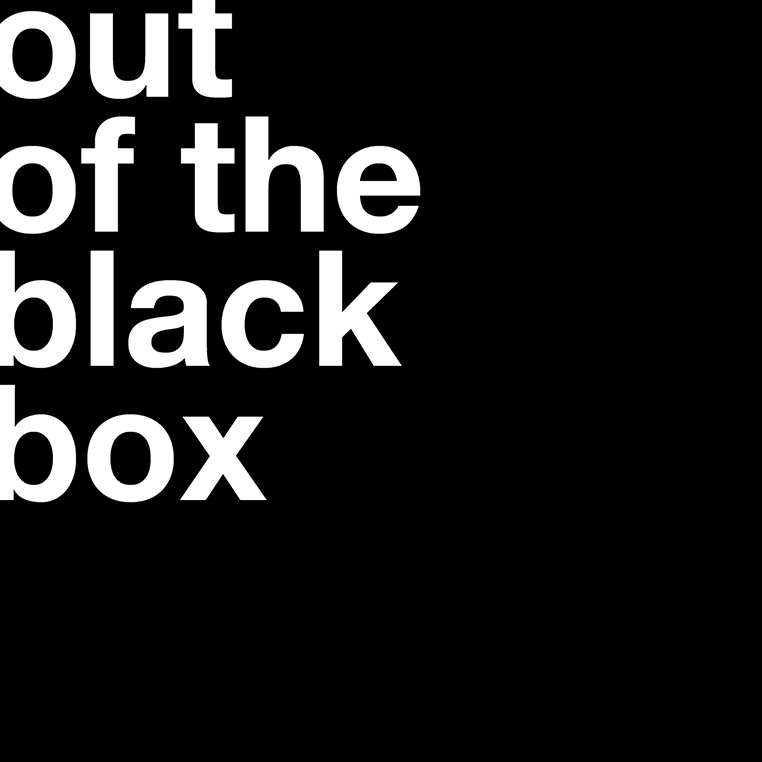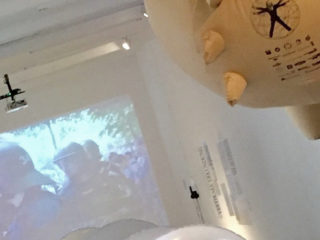
“To open up theatre for a broader population, rather than drive the message, maybe you get everyone asking questions. And all learn something together.”
The Freie Universität (FU), was founded as the Cold War began in 1948, out of a desire for a centre of learning in divided Berlin, that was free from any political control. Now one of Germany’s top universities it has a strong international research presence, one aspect of which is its Interweaving Performance Cultures (IPC) fellowship programme. The campus mostly sits in Dahlem, a district of South West Berlin, and that’s where Dr. Ramona Mosse and Professor Evelyn Annuß (both IPC Fellows and now, academic staff at the FU Institute for Theater Studies) and I, have gathered to chat about internationalism and politics in German theatre.
Ramona joined the teaching staff here about 5 years ago after completing her IPC fellowship. She’s currently writing a book (working title): ‘Between Tragedy and Utopia: Staging Cold War Culture.’ Her other research interests include developing new ideas of sound and environmental performance. She previously worked as a Dramaturg at companies like New York’s Mabou Mines and still does some artistically creative work. “We just did a dance piece in Berlin, Playing with Virtual Realities, in collaboration with a computer scientist and a specialist in human interaction with technology,” she says, “using dance to explore what happens at the interaction of the virtual and real worlds. It went really well so we’re taking it to Stuttgart next.”
Evelyn is a guest professor here, working at the intersection of theatre, media and literary studies. “I focussed on Elfriede Jelinek’s writing for a long time,” she says, “and now, I’m just wrapping up a book on Nazi mass stagings. The new project will be an exploration of performances in black-face from a global perspective. The German discourse on this is still very limited. I’ve worked in Munich and Bochum previously but at heart, I’m a Berliner and the theatre here is a key focus for me.”

So, what’s so interesting about Berlin and its approach to internationalism?
“It’s twofold,” says Ramona, “On the one hand, it’s really opened up and internationalised here in the past ten years, addressing wider issues. And on the other, people are coming from all over the world to learn from the work here and to develop their own approach before going home to stage the results.” So the actual German productions tend not to travel even though the influence of German theatre can be felt in many other countries, . Which stacks up with the UK environment where we see quite a bit of work from the Schaubühne, which has a dedicated touring strand, but not a lot else.
And how about the other way around – how much scope do you see for international work coming into Berlin?
Ramona again: “Germany tends to create festival structures to provide space for this. In Berlin, there’s also organisations like the Hebbel Am Ufer (HAU) for the freie szene (independent theatre) and the Berliner Festspiele which runs a variety of festivals including Germany’s most prestigious theatre festival, Theatertreffen. And now, there’s also the new Volksbühne. Otherwise, it’s always been very much a universe unto itself mostly because of the operational structure, the ensemble approach and the way it’s financed. It’s a very different landscape to the UK but its pretty well-funded and can afford to experiment. And that also means it can be more overtly political.”

She continues: “British theatre is author-based, working with dramatic playwriting. It’s produced a lot of really incredible playwrights, some of whom have been produced here. In Germany it’s more director-based, I think for political reasons. This ‘attack on the text’ – the deconstruction of the text – is an art-based way of questioning authority, tradition and the establishment. There’s a clear division between text and performance and a lot of work is devised. It would be great to see more contemporary German writing, but if you really want to work in theatre here, you don’t want to be a playwright because your stuff just gets taken apart.”
I think about Heiner Müller’s dissection of Shakespeare in Die Hamletmaschine, which in the Maxim Gorki Theater’s Exil Ensemble production directed by Sebastian Nübling, has now itself been spliced with Syrian writer, Ayham Majid Agha’s reflections on the current civil war…

But on the upside, doesn’t this deconstructive approach offer fertile ground for joint cultural work as it should make it easier to open up on a practical, as well as theoretical, basis?
Ramona and Evelyn aren’t so sure. Ramona: “It maybe looks like that, but it was all very German-focussed for such a long time. There were so many inter-generational questions around National Socialism – how do you deal with that? Some of the wider postcolonial and multicultural debates have only happened here since the 2000s. And with the notable exception of the Gorki Theater, even many of the ensembles are still predominantly white German and blind casting remains a radical choice.” Evelyn disagrees: “There are issues around casting sure, but the specific mode of aesthetics is less concerned with relating the body of the actor to the figure shown. And as another angle on inclusivity, one of our blind spots is the old DDR. Inclusive theatre should also address this.” “It’s important to see a range of ethnicities amongst the actors on stage and extend this into the writing and direction too,” explains Ramona, “but if the Gorki’s identified as the ‘Inclusion Theatre’ do the others have to bother? How do you then get them to embed this into their programmes too?”
“Dealing with refugee inclusion happens on two levels,” adds Evelyn, “First, make sure that there’s a platform for people to do what they want to do, to speak for themselves directly. Secondly, to address the issues in the wider theatre programme, allowing the aesthetic and political influences to speak.”
And how about theatre as activist? If theatre organisations take on an activist stance, doesn’t that affect the imperative at the root of their work?
“Many German theatres have taken up causes, both directly theatrical and in the wider social arena,” says Ramona. “For a long time, Berlin’s Turkish population had nowhere to perform and no access to state funding. Then HAU and Ballhaus Naunynstraße opened up and the situation, whilst not fully resolving, at least changed for the better. About three years ago, many theatres offered support to the new refugees who came here, encouraging debate, setting up support cafes, even offering temporary housing, as well as incorporating this and other issues of ethnic identity into their artistic programmes.”
Evelyn: “In 2015, it blew my mind how the theatres contributed to putting something on the agenda that criticised the European border politics. It was extremely valuable and definitely had an impact. And at that time, the audiences wanted to see work about this.”
“But there’s a difference between picking up a public conversation and actually committing to fostering a different kind of aesthetic environment that lasts and creating structures that will last, like the Gorki’s doing” adds Ramona.

And how about widening audience inclusion? Maybe through playing a role in social thinking. How much can theatres be a home for true debate?
Evelyn: “Theatres are also social venues, it’s not just what’s happening on stage. The Gorki’s doing a great job, and it may not be on such an ethnically inclusive level, but many people think that the old Volksbühne played a similar role. We were socialised there, people attached to it, some not even really perceiving it as a theatre. There were advanced aesthetics and a full drama programme sure, but there were all sorts of other activities there too – debates, connections – it all built up an ‘energy of linkage’. And that strengthened sustainability.”
“Politics is a form of branding for theatres as well, so in order to keep your theatre going, you address the political issues of the day,” Ramona adds, “there’s always a public programming strand around current politics. That creates a political community within the theatre that doesn’t seem to happen in the UK or America. It’s something detached from the Art. It was very different in the DDR because theatre was one of the only places where you could express dissent, albeit in a veiled metaphorical way. That was often why people went.”
“And the Volksbühne under Frank Castorf was the afterlife of that,” says Evelyn, “but that’s gone now – the politicians are targeting a new image for Berlin.” (In May 2017, the government imposed a change of leadership and new direction for this much-loved Berlin institution. Appointing Tate Modern director, Chris Dercon, they unexpectedly sparked off an incredibly powerful community reaction of sustained direct protest at the theatre, a city-wide sticker campaign featuring the words “Tschüss (Goodbye) Chris” and more besides, until he eventually resigned in April 2018. Subsequent to this interview, it transpired that Evelyn had run a petition to have this decision reviewed attracting more than 40,000 signatures).
And how does all this reach beyond the bubble of the classically established middle class audience? If we want to change the world, how do we get to the whole world?
Ramona: “I always reference Rimini Protokoll – they take a lot of current themes, often taking you out of the theatre and putting you into extraordinary places. You encounter these experts of the everyday and it’s fascinating but … the audience is still mostly the same audience that went before.” Perhaps its reach could be extended, marketed differently? Ramona: “Another approach is to involve the community directly – Claudia Bosse did a staging of The Persians with a chorus of 500 people drawn from each city it toured to.” A similar idea to National Theatre Wales’ production of The Passion in Port Talbot, where the whole town participated as the crowd and by all accounts, kept talking about it for ages afterwards. Evelyn: “Structurally, I think the old Volksbuhne model was a great way to involve all sorts of people. But if you want to open up theatre for a broader population, maybe you don’t drive the message but rather get everyone asking questions that they can take up. And all learn something together.”

Photo credits
Homepage : Berlin flyposter, ‘Goodbye Chris’. Photo © Julia Grime
Main photo : Volksbühne panorama. Photo © Julia Grime
15 March 2018:
Freie Universität, Berlin






Leave a Reply
You must be logged in to post a comment.